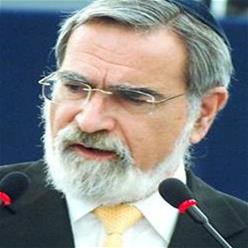
Jewish News

Jonathan Sacks awarded 2016 Templeton Prize
OWN CORRESPONDENT
The Templeton Prize, valued at £1,1 million, is one of the world’s largest annual awards given to an individual and honours a living person who has made exceptional contributions to affirming life’s spiritual dimension, whether through insight, discovery, or practical works.
The announcement was made at a news conference last week at the British Academy in London by the John Templeton Foundation, based in West Conshohocken, Pennsylvania.
The Prize anchors the Foundation’s international efforts to serve as a philanthropic catalyst for discoveries relating to human purpose and ultimate reality.
Rabbi Sacks, 67, first gained attention by leading what many consider the revitalisation of Britain’s Jewish community during his service as Chief Rabbi from 1991 to 2013, a feat he accomplished in the face of dwindling congregations and growing secularisation across Europe.
During his tenure he catalysed a network of organisations that introduced a Jewish focus in areas including business, women’s issues and education, and urged British Jewry to turn outward to share the ethics of their faith with the broader community.
Central to his message is appreciation and respect of all faiths, with an emphasis that recognising the values of each is the only path to effectively combat the global rise of violence and terrorism”, the release states.
In his most recent book, “Not in G-d’s Name: Confronting Religious Violence”, Rabbi Sacks writes: “Too often in the history of religion, people have killed in the name of the G-d of life, waged war in the name of the G-d of peace, hated in the name of the G-d of love and practised cruelty in the name of the G-d of compassion.
“When this happens, G-d speaks, sometimes in a still, small voice almost inaudible beneath the clamour of those claiming to speak on His behalf. What He says at such times is: ‘Not in My Name’.”
He also boldly defends the compatibility of religion and science, a response to those who consider them necessarily separate and distinct.
“Science takes things apart to see how they work. Religion puts things together to see what they mean,” he wrote in his book, “The Great Partnership: Science, Religion, and the Search for Meaning”.
The Prize anchors the Foundation’s international efforts to serve as a philanthropic catalyst for discoveries relating to human purpose and ultimate reality. That catalyst includes presenting each year’s Prize laureate with a series of what the Foundation calls “Big Questions”, a tradition that echoes the legacy of founder Sir John Templeton, the legendary investor and philanthropist who sought to foster and recognise spiritual progress.
In videos on the Prize website, Rabbi Sacks tackles many issues, including the recent spread of religious violence which he argues has been sparked by the export of Western secularisation.
Unfortunately, he says, that secularisation has failed to provide guidance on core issues of human identity, creating a vacuum being filled by religious fundamentalism that often stokes hatred. The parallel rise of social media has engulfed an ever larger swath of the population, especially youth.
The solution, he contends, is to match the violence with “a message of love as powerful as the message being delivered by the preachers of hate”, adding: “It really has to speak to young people and we have to use the same social networking, the same technology as the extremists and we’ve got to do it as well and better than they do.”
In remarks prepared for the media conference, Rabbi Sacks says: “Religion, or more precisely, religions, should have a voice in the public conversation within the societies of the West, as to how to live, how to construct a social order, how to enhance human dignity, honour human life, and indeed protect life as a whole… Each religion, and each strand within each religion, will have to undertake this work, because if religion is not part of the solution, it will assuredly be a large part of the problem as voices become ever more strident, and religious extremists ever more violent.”
Rabbi Sacks joins a distinguished group of 45 former recipients, including Mother Teresa, who received the inaugural Prize award in 1973, Aleksandr Solzhenitsyn (1983), and philosopher Charles Taylor (2007). Last year’s Prize winner was Canadian theologian Jean Vanier, founder of L’Arche, an international network of communities where people with and without intellectual disabilities live and work together as peers.
Rabbi Sacks was knighted by the Queen in 2005 and awarded a Life Peerage in the British House of Lords in 2009.
He has been married to the former Elaine Taylor since 1970.They have three children and eight grandchildren.




